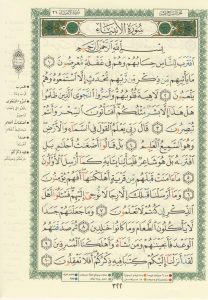Surah Anbiya
Contents
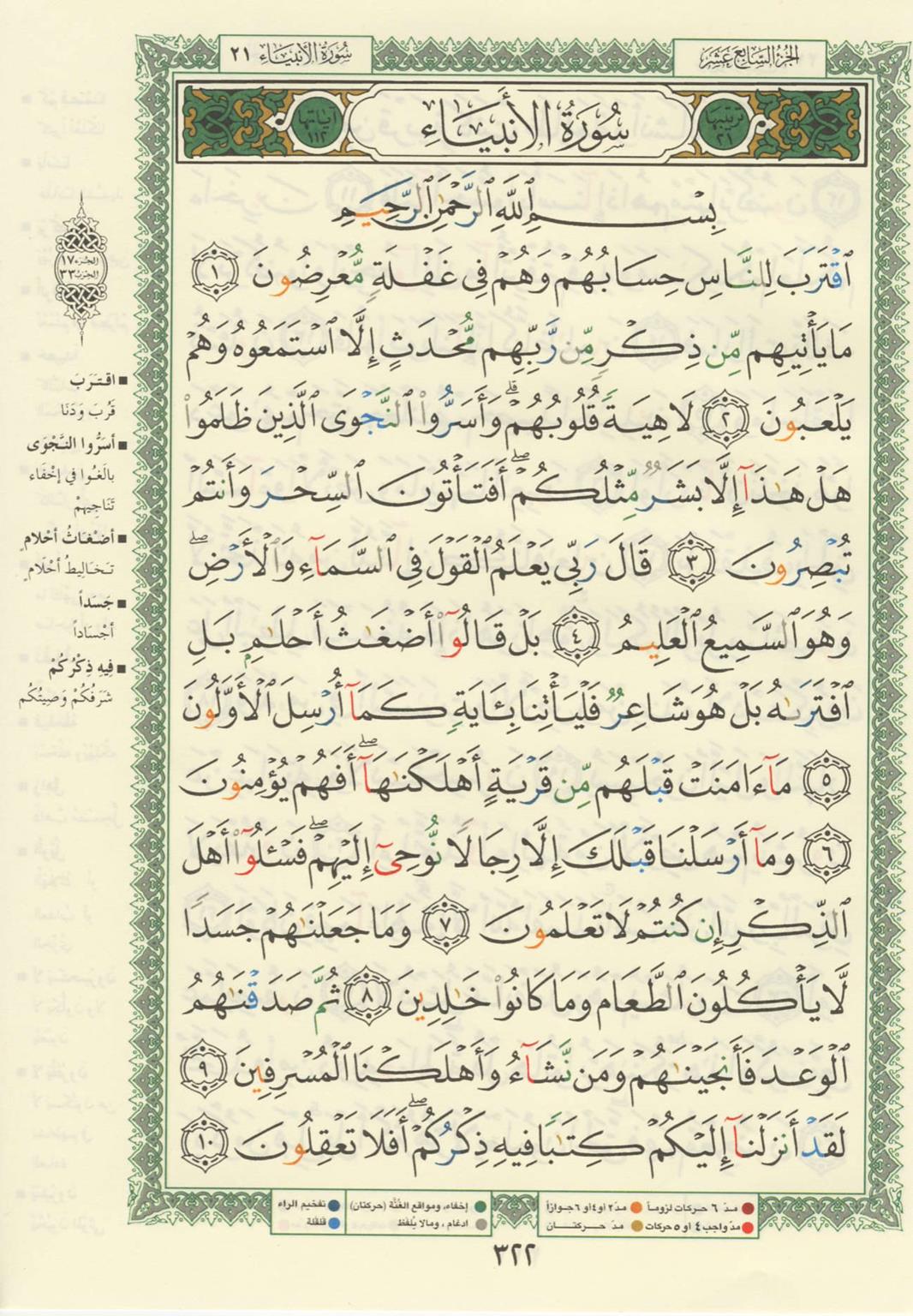
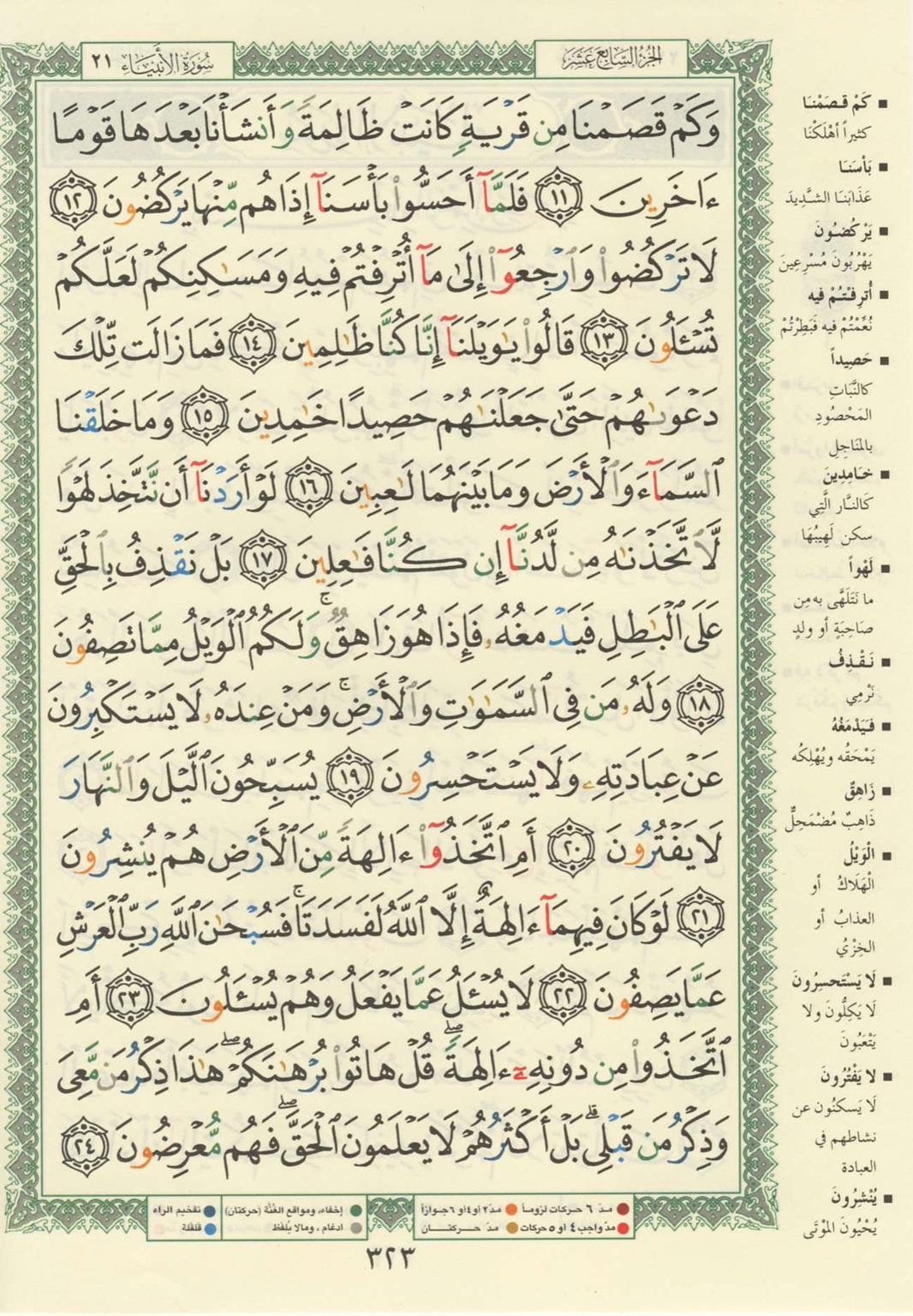
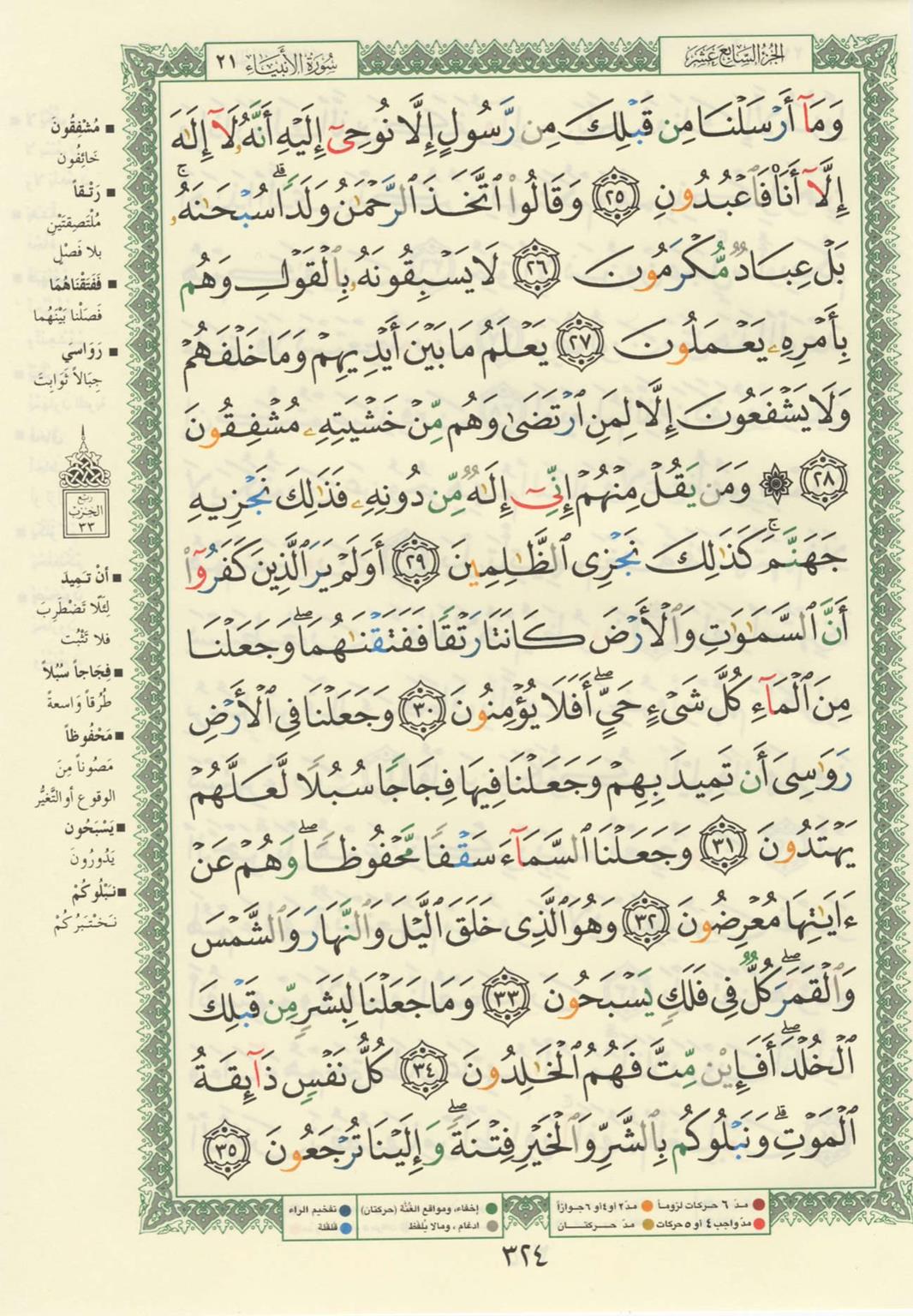
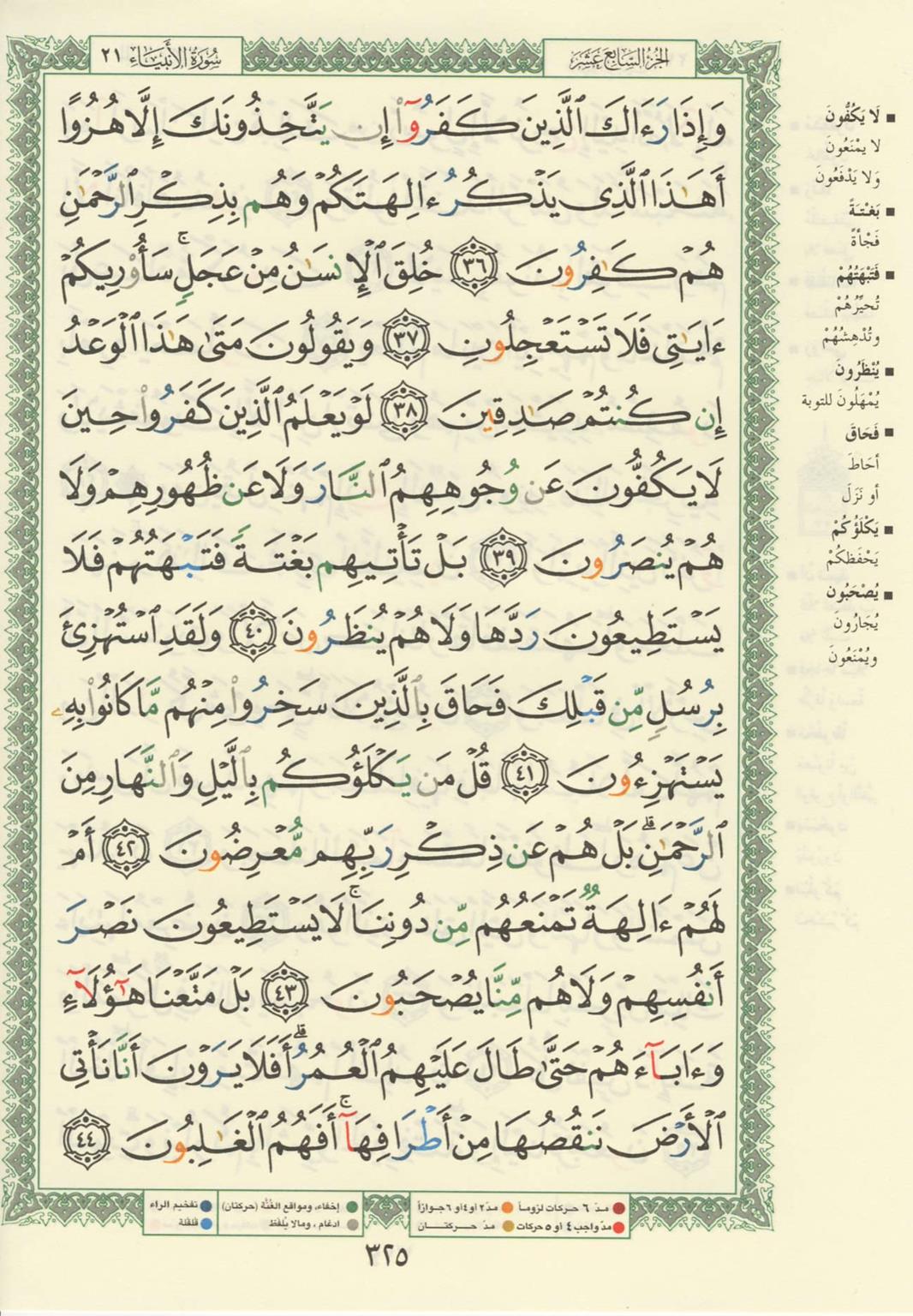
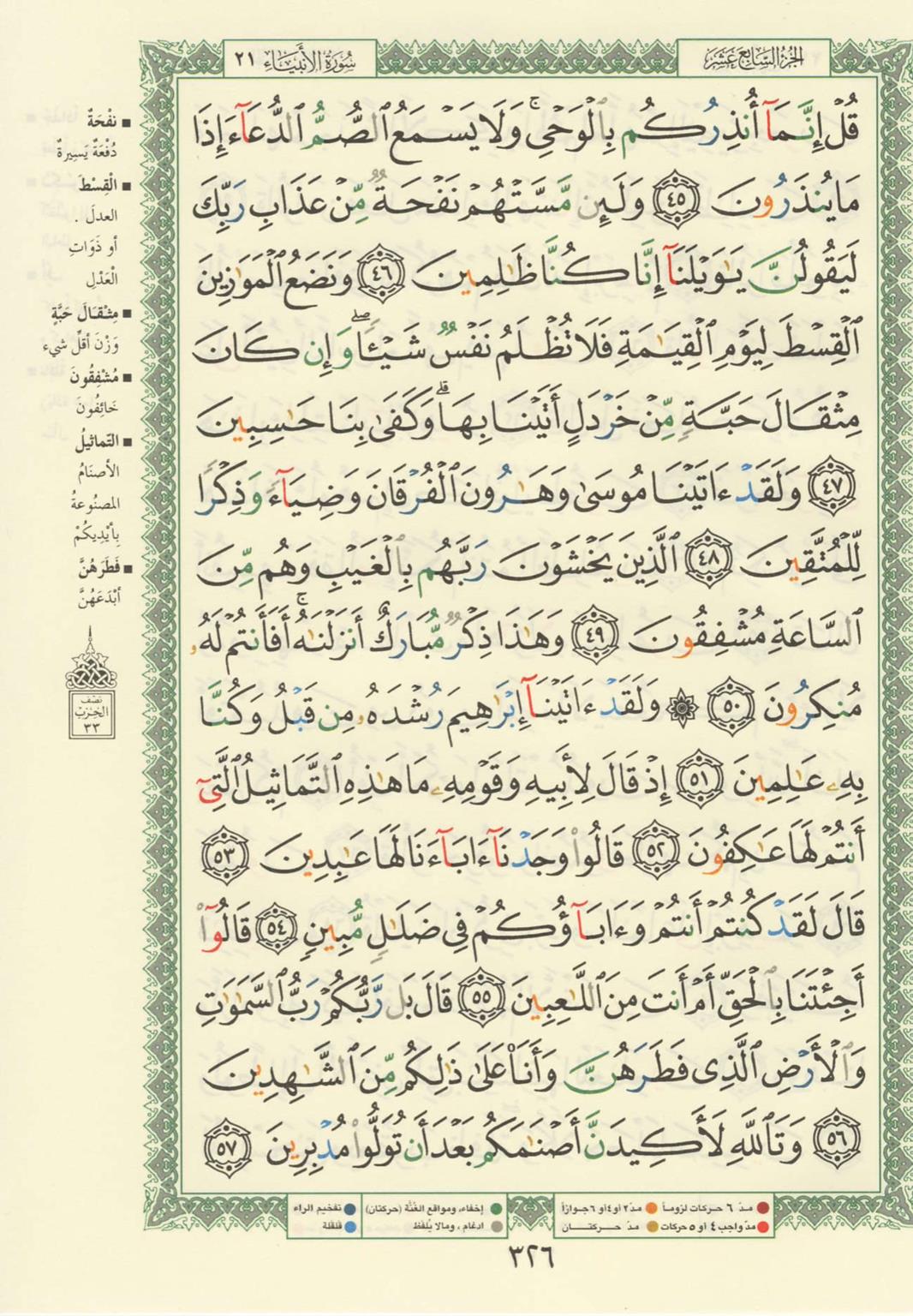
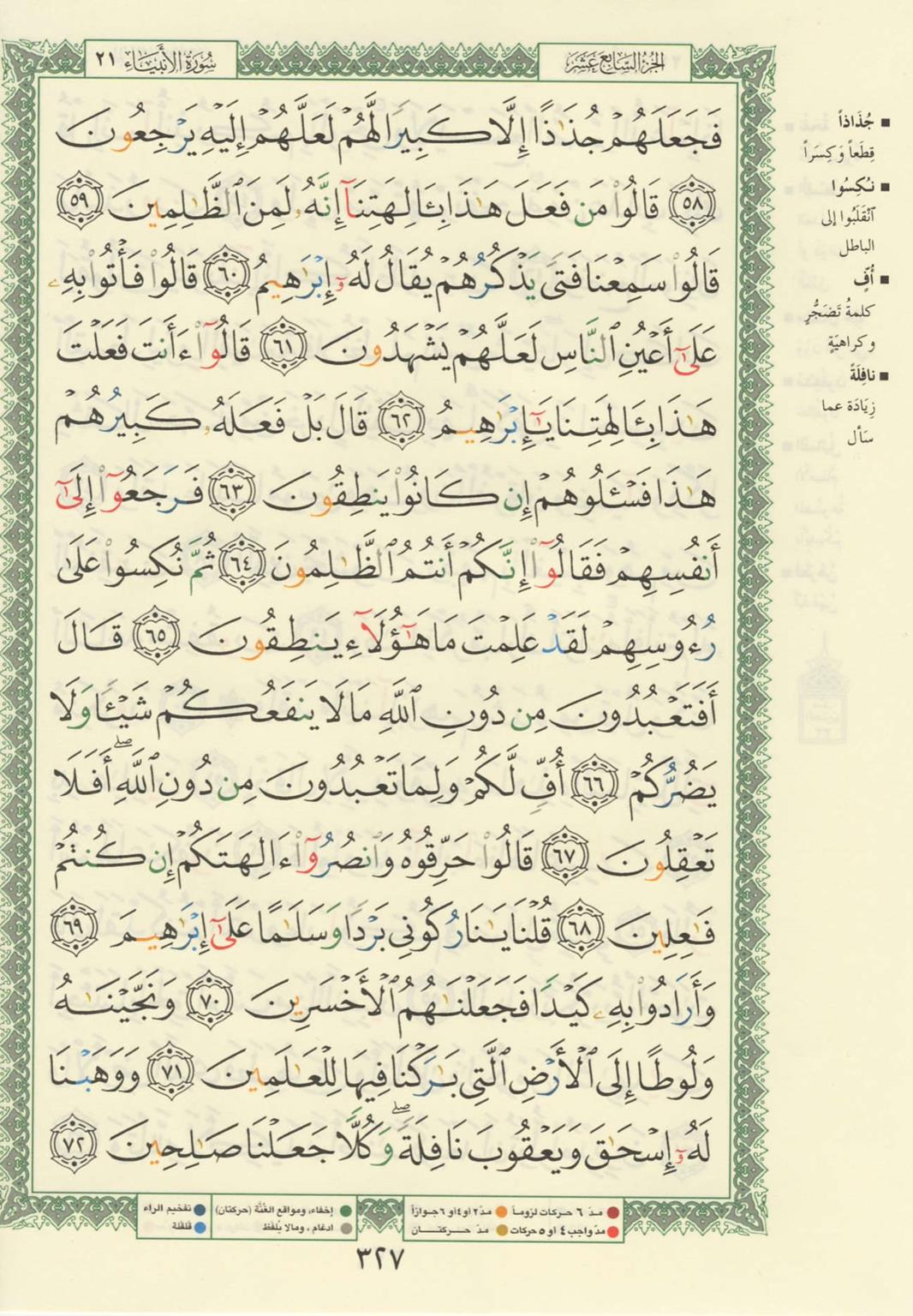
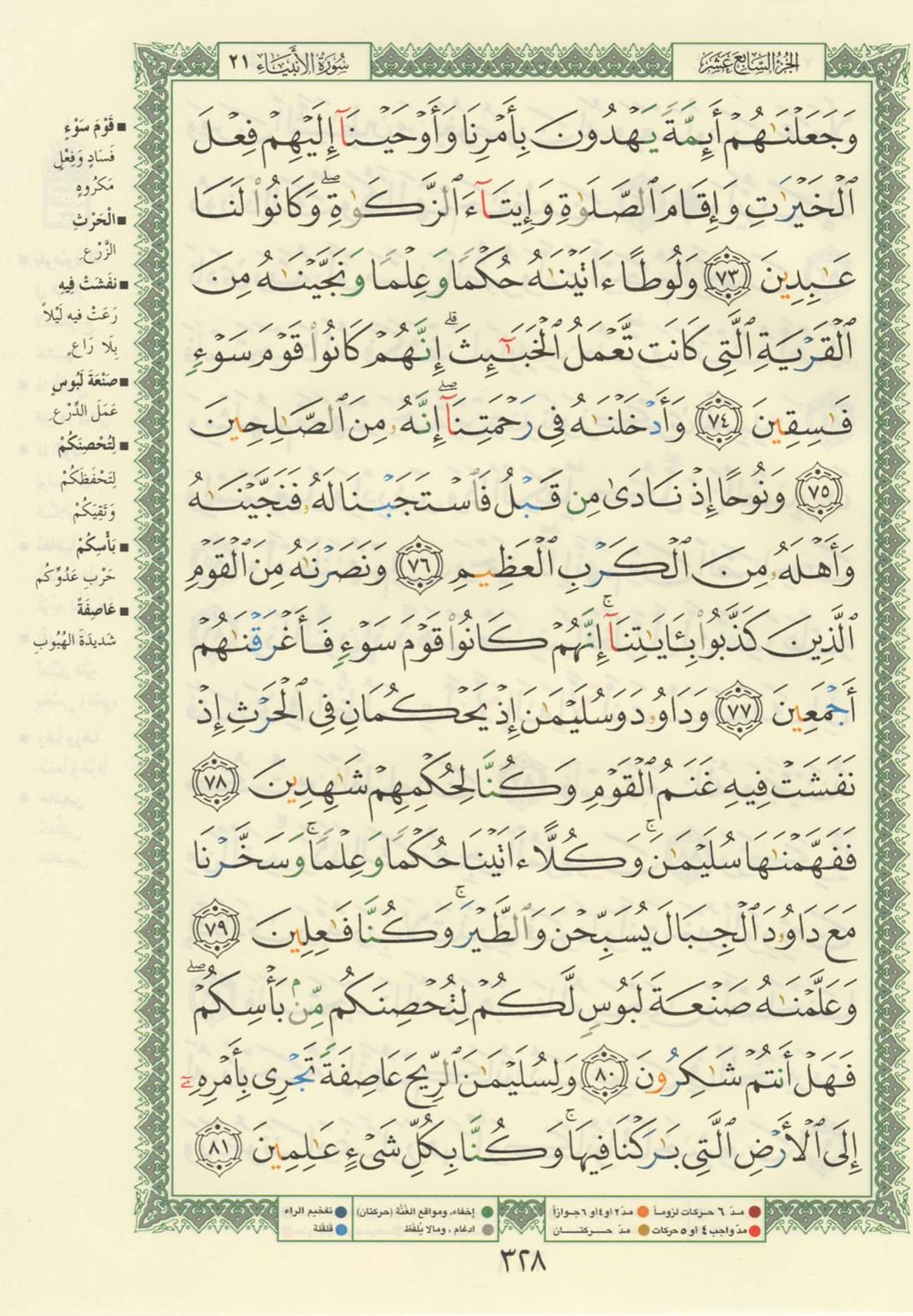
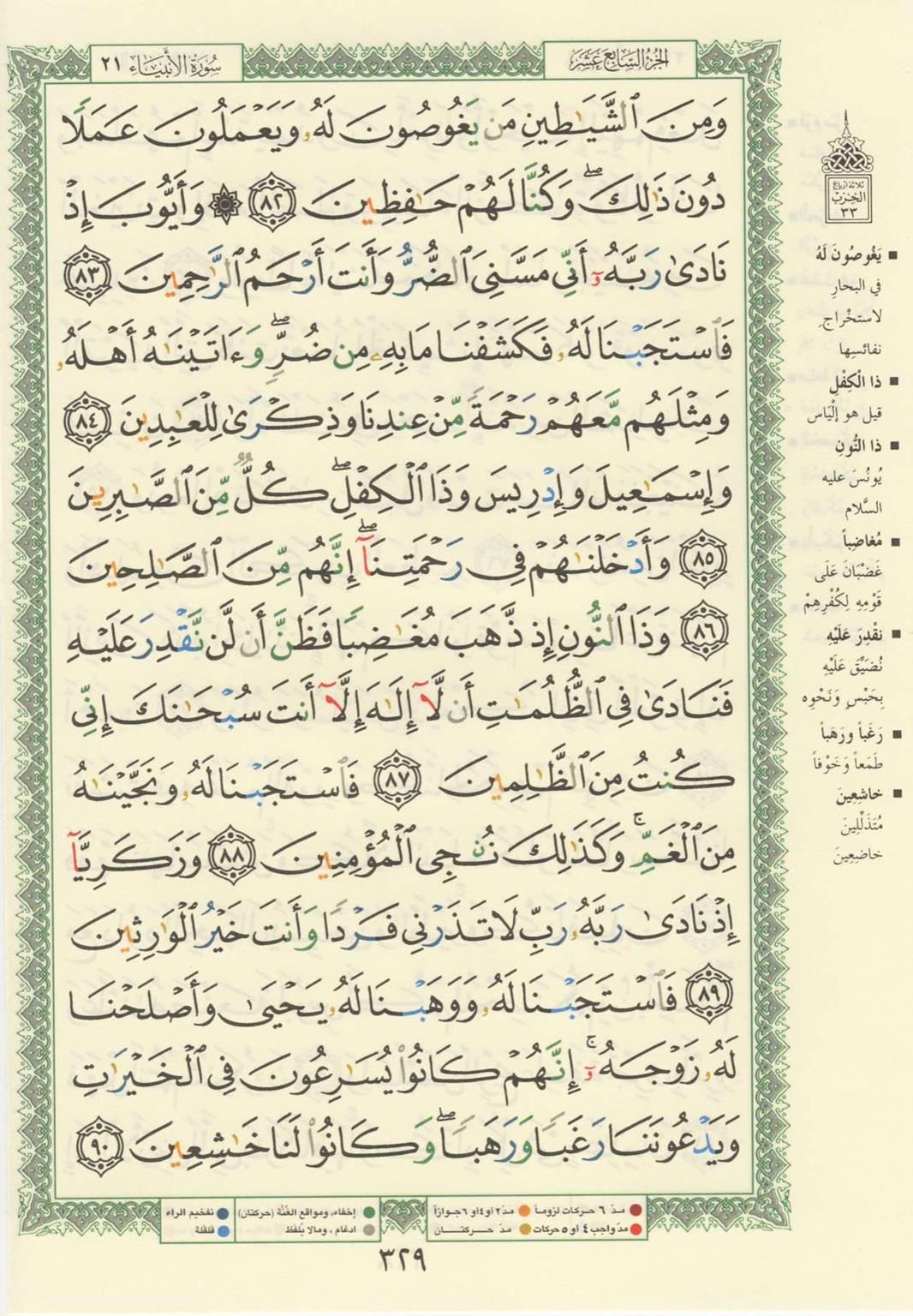
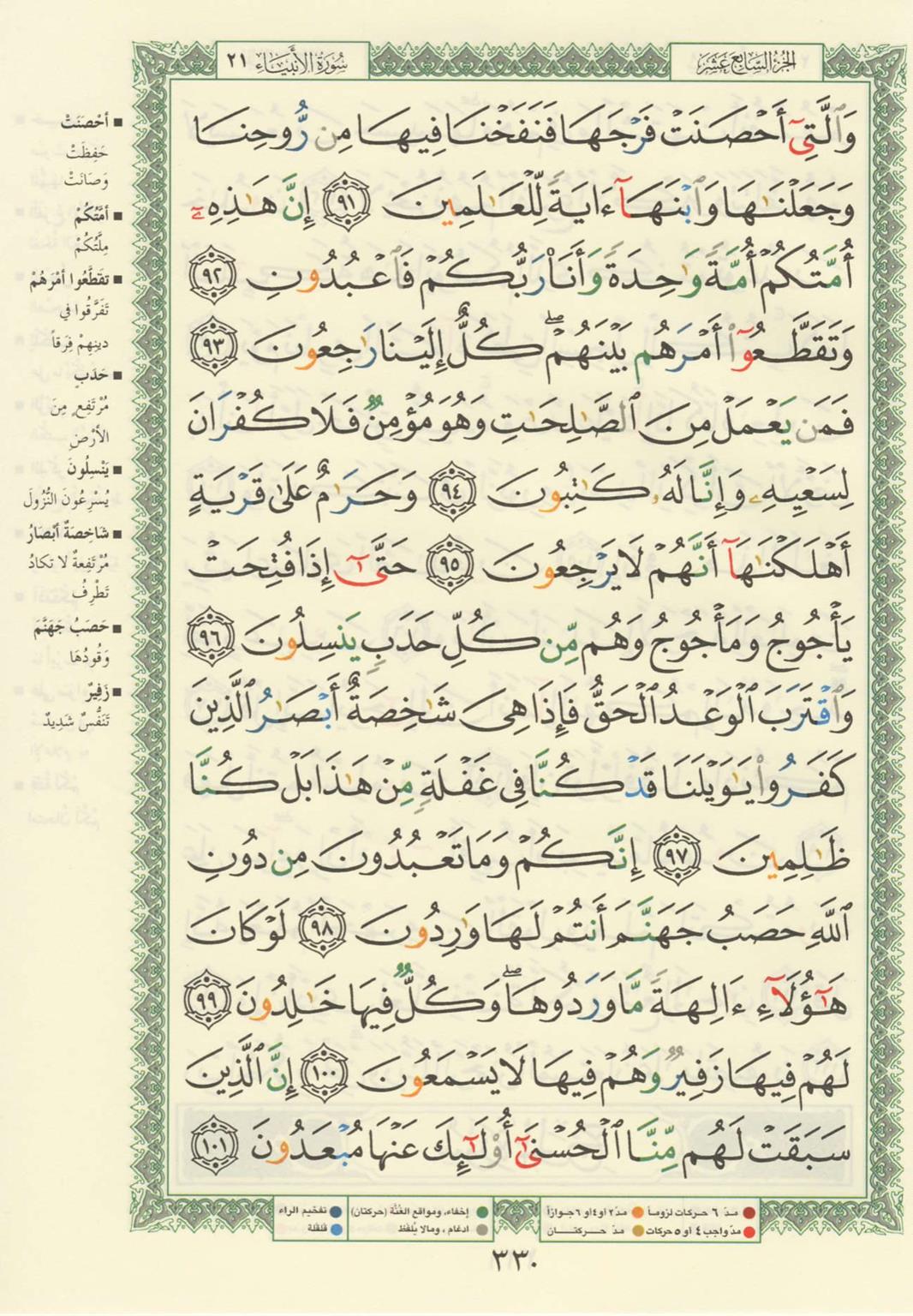
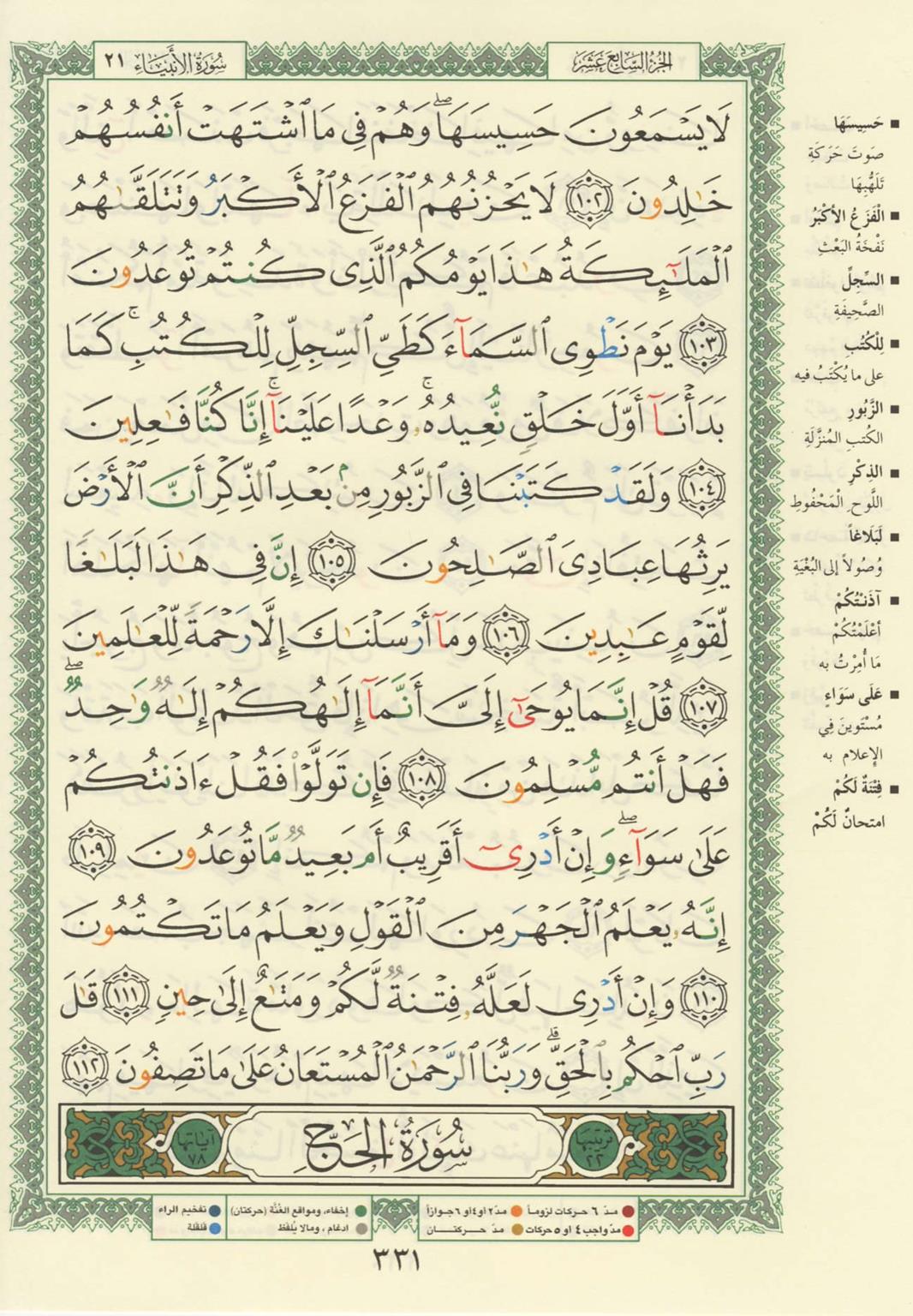
Page 322
21:1
ق-ر-ب
![]() ٱقۡتَرَبَ
اِقْتَرَبَ
iq'taraba
(Has) approached
ٱقۡتَرَبَ
اِقْتَرَبَ
iq'taraba
(Has) approached
ن-و-س
![]() لِلنَّاسِ
لِلنَّاسِ
lilnnāsi
for [the] mankind
لِلنَّاسِ
لِلنَّاسِ
lilnnāsi
for [the] mankind
ح-س-ب
![]() حِسَابُهُمۡ
حِسَابُهُمْ
ḥisābuhum
their account,
حِسَابُهُمۡ
حِسَابُهُمْ
ḥisābuhum
their account,
ه-م
![]() وَهُمۡ
وَهُمْ
wahum
while they
وَهُمۡ
وَهُمْ
wahum
while they
ف-ي
![]() فِي
فِیْ
fī
(are) in
فِي
فِیْ
fī
(are) in
غ-ف-ل
![]() غَفۡلَةٖ
غَفْلَةٍ
ghaflatin
heedlessness
غَفۡلَةٖ
غَفْلَةٍ
ghaflatin
heedlessness
ع-ر-ض
![]() مُّعۡرِضُونَ
مُّعْرِضُوْنَ
muʿ'riḍūna
turning away.
مُّعۡرِضُونَ
مُّعْرِضُوْنَ
muʿ'riḍūna
turning away.
21:2
م-ا
![]() مَا
مَا
mā
Not
مَا
مَا
mā
Not
ا-ت-ي
![]() يَأۡتِيهِم
یَاْتِیْهِمْ
yatīhim
comes to them
يَأۡتِيهِم
یَاْتِیْهِمْ
yatīhim
comes to them
م-ن
![]() مِّن
مِّنْ
min
of
مِّن
مِّنْ
min
of
ذ-ك-ر
![]() ذِكۡرٖ
ذِكْرٍ
dhik'rin
a Reminder
ذِكۡرٖ
ذِكْرٍ
dhik'rin
a Reminder
م-ن
![]() مِّن
مِّنْ
min
from
مِّن
مِّنْ
min
from
ر-ب-ب
![]() رَّبِّهِم
رَّبِّهِمْ
rabbihim
their Lord,
رَّبِّهِم
رَّبِّهِمْ
rabbihim
their Lord,
ح-د-ث
![]() مُّحۡدَثٍ
مُّحْدَثٍ
muḥ'dathin
anew
مُّحۡدَثٍ
مُّحْدَثٍ
muḥ'dathin
anew
ا-ل-ل-ا
![]() إِلَّا
اِلَّا
illā
except
إِلَّا
اِلَّا
illā
except
س-م-ع
![]() ٱسۡتَمَعُوهُ
اسْتَمَعُوْهُ
is'tamaʿūhu
they listen to it
ٱسۡتَمَعُوهُ
اسْتَمَعُوْهُ
is'tamaʿūhu
they listen to it
ه-م
![]() وَهُمۡ
وَهُمْ
wahum
while they
وَهُمۡ
وَهُمْ
wahum
while they
ل-ع-ب
![]() يَلۡعَبُونَ
یَلْعَبُوْنَ
yalʿabūna
(are at) play
يَلۡعَبُونَ
یَلْعَبُوْنَ
yalʿabūna
(are at) play
21:3
ل-ه-و
![]() لَاهِيَةٗ
لَاهِیَةً
lāhiyatan
Distracted
لَاهِيَةٗ
لَاهِیَةً
lāhiyatan
Distracted
ق-ل-ب
![]() قُلُوبُهُمۡۗ
قُلُوْبُهُمْ ؕ—
qulūbuhum
their hearts.
قُلُوبُهُمۡۗ
قُلُوْبُهُمْ ؕ—
qulūbuhum
their hearts.
س-ر-ر
![]() وَأَسَرُّواْ
وَاَسَرُّوا
wa-asarrū
And they conceal
وَأَسَرُّواْ
وَاَسَرُّوا
wa-asarrū
And they conceal
ن-ج-و
![]() ٱلنَّجۡوَى
النَّجْوَی ۖۗ—
n-najwā
the private conversation,
ٱلنَّجۡوَى
النَّجْوَی ۖۗ—
n-najwā
the private conversation,
ا-ل-ل-ذ
![]() ٱلَّذِينَ
الَّذِیْنَ
alladhīna
those who
ٱلَّذِينَ
الَّذِیْنَ
alladhīna
those who
ظ-ل-م
![]() ظَلَمُواْ
ظَلَمُوْا ۖۗ—
ẓalamū
[they] wronged,
ظَلَمُواْ
ظَلَمُوْا ۖۗ—
ẓalamū
[they] wronged,
ه-ل
![]() هَلۡ
هَلْ
hal
"Is
هَلۡ
هَلْ
hal
"Is
ه-ا-ذ
![]() هَٰذَآ
هٰذَاۤ
hādhā
this
هَٰذَآ
هٰذَاۤ
hādhā
this
ا-ل-ل-ا
![]() إِلَّا
اِلَّا
illā
except
إِلَّا
اِلَّا
illā
except
ب-ش-ر
![]() بَشَرٞ
بَشَرٌ
basharun
a human being
بَشَرٞ
بَشَرٌ
basharun
a human being
م-ث-ل
![]() مِّثۡلُكُمۡۖ
مِّثْلُكُمْ ۚ—
mith'lukum
like you?
مِّثۡلُكُمۡۖ
مِّثْلُكُمْ ۚ—
mith'lukum
like you?
ا-ت-ي
![]() أَفَتَأۡتُونَ
اَفَتَاْتُوْنَ
afatatūna
So would you app
أَفَتَأۡتُونَ
اَفَتَاْتُوْنَ
afatatūna
So would you app
س-ح-ر
![]() ٱلسِّحۡرَ
السِّحْرَ
s-siḥ'ra
the magic
ٱلسِّحۡرَ
السِّحْرَ
s-siḥ'ra
the magic
ا-ن-ت-م
![]() وَأَنتُمۡ
وَاَنْتُمْ
wa-antum
while you
وَأَنتُمۡ
وَاَنْتُمْ
wa-antum
while you
ب-ص-ر
![]() تُبۡصِرُونَ
تُبْصِرُوْنَ
tub'ṣirūna
see (it)?"
تُبۡصِرُونَ
تُبْصِرُوْنَ
tub'ṣirūna
see (it)?"
21:4
ق-و-ل
![]() قَالَ
قٰلَ
qāla
He said,
قَالَ
قٰلَ
qāla
He said,
ر-ب-ب
![]() رَبِّي
رَبِّیْ
rabbī
"My Lord
رَبِّي
رَبِّیْ
rabbī
"My Lord
ع-ل-م
![]() يَعۡلَمُ
یَعْلَمُ
yaʿlamu
knows
يَعۡلَمُ
یَعْلَمُ
yaʿlamu
knows
ق-و-ل
![]() ٱلۡقَوۡلَ
الْقَوْلَ
l-qawla
the word
ٱلۡقَوۡلَ
الْقَوْلَ
l-qawla
the word
ف-ي
![]() فِي
فِی
fī
in
فِي
فِی
fī
in
س-م-و
![]() ٱلسَّمَآءِ
السَّمَآءِ
s-samāi
the heavens
ٱلسَّمَآءِ
السَّمَآءِ
s-samāi
the heavens
ا-ر-ض
![]() وَٱلۡأَرۡضِۖ
وَالْاَرْضِ ؗ—
wal-arḍi
and the earth.
وَٱلۡأَرۡضِۖ
وَالْاَرْضِ ؗ—
wal-arḍi
and the earth.
ه-و
![]() وَهُوَ
وَهُوَ
wahuwa
And He
وَهُوَ
وَهُوَ
wahuwa
And He
س-م-ع
![]() ٱلسَّمِيعُ
السَّمِیْعُ
s-samīʿu
(is) the All-Hearer,
ٱلسَّمِيعُ
السَّمِیْعُ
s-samīʿu
(is) the All-Hearer,
ع-ل-م
![]() ٱلۡعَلِيمُ
الْعَلِیْمُ
l-ʿalīmu
the All-Knower."
ٱلۡعَلِيمُ
الْعَلِیْمُ
l-ʿalīmu
the All-Knower."
21:5
ب-ل
![]() بَلۡ
بَلْ
bal
Nay,
بَلۡ
بَلْ
bal
Nay,
ق-و-ل
![]() قَالُوٓاْ
قَالُوْۤا
qālū
they say,
قَالُوٓاْ
قَالُوْۤا
qālū
they say,
ض-غ-ث
![]() أَضۡغَٰثُ
اَضْغَاثُ
aḍghāthu
"Muddled
أَضۡغَٰثُ
اَضْغَاثُ
aḍghāthu
"Muddled
ح-ل-م
![]() أَحۡلَٰمِۭ
اَحْلَامٍ
aḥlāmin
dreams;
أَحۡلَٰمِۭ
اَحْلَامٍ
aḥlāmin
dreams;
ب-ل
![]() بَلِ
بَلِ
bali
nay,
بَلِ
بَلِ
bali
nay,
ف-ر-ي
![]() ٱفۡتَرَىٰهُ
افْتَرٰىهُ
if'tarāhu
he (has) invented it;
ٱفۡتَرَىٰهُ
افْتَرٰىهُ
if'tarāhu
he (has) invented it;
ب-ل
![]() بَلۡ
بَلْ
bal
nay,
بَلۡ
بَلْ
bal
nay,
ه-و
![]() هُوَ
هُوَ
huwa
he
هُوَ
هُوَ
huwa
he
ش-ع-ر
![]() شَاعِرٞ
شَاعِرٌ ۖۚ—
shāʿirun
(is) a poet.
شَاعِرٞ
شَاعِرٌ ۖۚ—
shāʿirun
(is) a poet.
ا-ت-ي
![]() فَلۡيَأۡتِنَا
فَلْیَاْتِنَا
falyatinā
So let him bring us
فَلۡيَأۡتِنَا
فَلْیَاْتِنَا
falyatinā
So let him bring us
ا-ي-ا
![]() بِـَٔايَةٖ
بِاٰیَةٍ
biāyatin
a sign
بِـَٔايَةٖ
بِاٰیَةٍ
biāyatin
a sign
ك-م-ا
![]() كَمَآ
كَمَاۤ
kamā
like what
كَمَآ
كَمَاۤ
kamā
like what
ر-س-ل
![]() أُرۡسِلَ
اُرْسِلَ
ur'sila
was sent
أُرۡسِلَ
اُرْسِلَ
ur'sila
was sent
ا-و-ل
![]() ٱلۡأَوَّلُونَ
الْاَوَّلُوْنَ
l-awalūna
(to) the former."
ٱلۡأَوَّلُونَ
الْاَوَّلُوْنَ
l-awalūna
(to) the former."
21:6
م-ا
![]() مَآ
مَاۤ
mā
Not
مَآ
مَاۤ
mā
Not
ا-م-ن
![]() ءَامَنَتۡ
اٰمَنَتْ
āmanat
believed
ءَامَنَتۡ
اٰمَنَتْ
āmanat
believed
ق-ب-ل
![]() قَبۡلَهُم
قَبْلَهُمْ
qablahum
before them
قَبۡلَهُم
قَبْلَهُمْ
qablahum
before them
م-ن
![]() مِّن
مِّنْ
min
any
مِّن
مِّنْ
min
any
ق-ر-ي
![]() قَرۡيَةٍ
قَرْیَةٍ
qaryatin
town
قَرۡيَةٍ
قَرْیَةٍ
qaryatin
town
ه-ل-ك
![]() أَهۡلَكۡنَٰهَآۖ
اَهْلَكْنٰهَا ۚ—
ahlaknāhā
which We destroyed,
أَهۡلَكۡنَٰهَآۖ
اَهْلَكْنٰهَا ۚ—
ahlaknāhā
which We destroyed,
ه-م
![]() أَفَهُمۡ
اَفَهُمْ
afahum
so will they
أَفَهُمۡ
اَفَهُمْ
afahum
so will they
ا-م-ن
![]() يُؤۡمِنُونَ
یُؤْمِنُوْنَ
yu'minūna
believe?
يُؤۡمِنُونَ
یُؤْمِنُوْنَ
yu'minūna
believe?
21:7
م-ا
![]() وَمَآ
وَمَاۤ
wamā
And not
وَمَآ
وَمَاۤ
wamā
And not
ر-س-ل
![]() أَرۡسَلۡنَا
اَرْسَلْنَا
arsalnā
We sent
أَرۡسَلۡنَا
اَرْسَلْنَا
arsalnā
We sent
ق-ب-ل
![]() قَبۡلَكَ
قَبْلَكَ
qablaka
before you
قَبۡلَكَ
قَبْلَكَ
qablaka
before you
ا-ل-ل-ا
![]() إِلَّا
اِلَّا
illā
except
إِلَّا
اِلَّا
illā
except
ر-ج-ل
![]() رِجَالٗا
رِجَالًا
rijālan
men,
رِجَالٗا
رِجَالًا
rijālan
men,
و-ح-ي
![]() نُّوحِيٓ
نُّوْحِیْۤ
nūḥī
We revealed
نُّوحِيٓ
نُّوْحِیْۤ
nūḥī
We revealed
ا-ل-ي
![]() إِلَيۡهِمۡۖ
اِلَیْهِمْ
ilayhim
to them.
إِلَيۡهِمۡۖ
اِلَیْهِمْ
ilayhim
to them.
س-ا-ل
![]() فَسۡـَٔلُوٓاْ
فَسْـَٔلُوْۤا
fasalū
So ask
فَسۡـَٔلُوٓاْ
فَسْـَٔلُوْۤا
fasalū
So ask
ا-ه-ل
![]() أَهۡلَ
اَهْلَ
ahla
(the) people
أَهۡلَ
اَهْلَ
ahla
(the) people
ذ-ك-ر
![]() ٱلذِّكۡرِ
الذِّكْرِ
dh-dhik'ri
(of) the Reminder,
ٱلذِّكۡرِ
الذِّكْرِ
dh-dhik'ri
(of) the Reminder,
ا-ن
![]() إِن
اِنْ
in
if
إِن
اِنْ
in
if
ك-و-ن
![]() كُنتُمۡ
كُنْتُمْ
kuntum
you
كُنتُمۡ
كُنْتُمْ
kuntum
you
ل-ا
![]() لَا
لَا
lā
(do) not
لَا
لَا
lā
(do) not
ع-ل-م
![]() تَعۡلَمُونَ
تَعْلَمُوْنَ
taʿlamūna
know.
تَعۡلَمُونَ
تَعْلَمُوْنَ
taʿlamūna
know.
21:8
م-ا
![]() وَمَا
وَمَا
wamā
And not
وَمَا
وَمَا
wamā
And not
ج-ع-ل
![]() جَعَلۡنَٰهُمۡ
جَعَلْنٰهُمْ
jaʿalnāhum
We made them
جَعَلۡنَٰهُمۡ
جَعَلْنٰهُمْ
jaʿalnāhum
We made them
ج-س-د
![]() جَسَدٗا
جَسَدًا
jasadan
bodies
جَسَدٗا
جَسَدًا
jasadan
bodies
ل-ا
![]() لَّا
لَّا
lā
not
لَّا
لَّا
lā
not
ا-ك-ل
![]() يَأۡكُلُونَ
یَاْكُلُوْنَ
yakulūna
eating
يَأۡكُلُونَ
یَاْكُلُوْنَ
yakulūna
eating
ط-ع-م
![]() ٱلطَّعَامَ
الطَّعَامَ
ṭ-ṭaʿāma
the food,
ٱلطَّعَامَ
الطَّعَامَ
ṭ-ṭaʿāma
the food,
م-ا
![]() وَمَا
وَمَا
wamā
and not
وَمَا
وَمَا
wamā
and not
ك-و-ن
![]() كَانُواْ
كَانُوْا
kānū
they were
كَانُواْ
كَانُوْا
kānū
they were
خ-ل-د
![]() خَٰلِدِينَ
خٰلِدِیْنَ
khālidīna
immortals.
خَٰلِدِينَ
خٰلِدِیْنَ
khālidīna
immortals.
21:9
ث-م-م
![]() ثُمَّ
ثُمَّ
thumma
Then
ثُمَّ
ثُمَّ
thumma
Then
ص-د-ق
![]() صَدَقۡنَٰهُمُ
صَدَقْنٰهُمُ
ṣadaqnāhumu
We fulfilled (for) them
صَدَقۡنَٰهُمُ
صَدَقْنٰهُمُ
ṣadaqnāhumu
We fulfilled (for) them
و-ع-د
![]() ٱلۡوَعۡدَ
الْوَعْدَ
l-waʿda
the promise,
ٱلۡوَعۡدَ
الْوَعْدَ
l-waʿda
the promise,
ن-ج-و
![]() فَأَنجَيۡنَٰهُمۡ
فَاَنْجَیْنٰهُمْ
fa-anjaynāhum
and We saved them
فَأَنجَيۡنَٰهُمۡ
فَاَنْجَیْنٰهُمْ
fa-anjaynāhum
and We saved them
م-ن
![]() وَمَن
وَمَنْ
waman
and whom
وَمَن
وَمَنْ
waman
and whom
ش-ي-ا
![]() نَّشَآءُ
نَّشَآءُ
nashāu
We
نَّشَآءُ
نَّشَآءُ
nashāu
We
ه-ل-ك
![]() وَأَهۡلَكۡنَا
وَاَهْلَكْنَا
wa-ahlaknā
and We destroyed
وَأَهۡلَكۡنَا
وَاَهْلَكْنَا
wa-ahlaknā
and We destroyed
س-ر-ف
![]() ٱلۡمُسۡرِفِينَ
الْمُسْرِفِیْنَ
l-mus'rifīna
the transgressors.
ٱلۡمُسۡرِفِينَ
الْمُسْرِفِیْنَ
l-mus'rifīna
the transgressors.
21:10
ق-د
![]() لَقَدۡ
لَقَدْ
laqad
Indeed,
لَقَدۡ
لَقَدْ
laqad
Indeed,
ن-ز-ل
![]() أَنزَلۡنَآ
اَنْزَلْنَاۤ
anzalnā
We (have) sent down
أَنزَلۡنَآ
اَنْزَلْنَاۤ
anzalnā
We (have) sent down
ا-ل-ي
![]() إِلَيۡكُمۡ
اِلَیْكُمْ
ilaykum
to you
إِلَيۡكُمۡ
اِلَیْكُمْ
ilaykum
to you
ك-ت-ب
![]() كِتَٰبٗا
كِتٰبًا
kitāban
a Book
كِتَٰبٗا
كِتٰبًا
kitāban
a Book
ف-ي
![]() فِيهِ
فِیْهِ
fīhi
in it
فِيهِ
فِیْهِ
fīhi
in it
ذ-ك-ر
![]() ذِكۡرُكُمۡۚ
ذِكْرُكُمْ ؕ—
dhik'rukum
(is) your mention.
ذِكۡرُكُمۡۚ
ذِكْرُكُمْ ؕ—
dhik'rukum
(is) your mention.
ل-ا
![]() أَفَلَا
اَفَلَا
afalā
Then will not
أَفَلَا
اَفَلَا
afalā
Then will not
ع-ق-ل
![]() تَعۡقِلُونَ
تَعْقِلُوْنَ
taʿqilūna
you use reason?
تَعۡقِلُونَ
تَعْقِلُوْنَ
taʿqilūna
you use reason?

